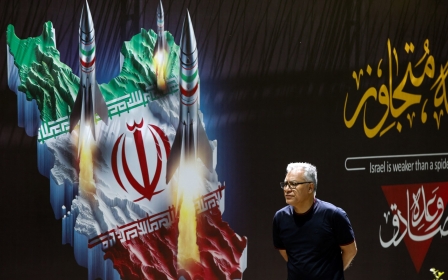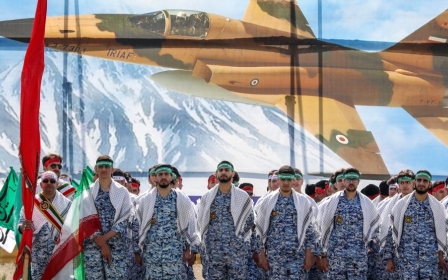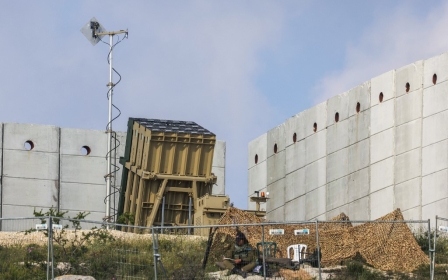Iran condemns 'malicious' attempts in UK to ban IRGC

Iran has hit out against a "malicious" campaign by British parliamentarians to ban the Islamic Revolutionary Guards Corp (IRGC).
In a letter from the All Party UK-Israel Parliamentary Group signed by MPs and members of the House of Lords, Prime Minister Rishi Sunak was called on to proscribe the organisation, which they said was responsible for "destructive terror" in the Middle East and beyond.
Iran's Embassy in the UK told Middle East Eye that the call to proscribe the IRGC was being pushed by "a few specific individuals and groups who are aiming to diminish and destroy the Iran-UK relationship".
"We believe that the push to designate the IRGC is influenced by external actors, notably the Israeli regime, which has a history of antagonism towards Iran," said the embassy in a statement.
"This attempt serves to escalate tensions and provoke confrontation rather than promote peace and stability in the region."
Stay informed with MEE's newsletters
Sign up to get the latest alerts, insights and analysis, starting with Turkey Unpacked
The embassy said the IRGC had been crucial in countering "terrorist threats and extremist groups" in the Middle East, including the Islamic State group.
"Accusations of terrorism against the IRGC are lack of substantiation and are driven by political agendas, serving only to benefit certain interests," it said.
The IRGC was formed following the 1979 Islamic Revolution in Iran and is part of the Islamic Republic's official military structure.
Calls to proscribe the organisation have come from politicians across all the major UK parties for many years.
Thursday's letter, signed by a cross-party selection of MPs and members of the House of Lords, said the IRGC was responsible for "destructive terror" in the Middle East and beyond.
It came in the wake of an attack launched against Israel by Iran on Saturday, consisting of around 170 drones, 30 cruise missiles, and 120 ballistic missiles, according to Israeli officials.
That attack was itself in response to a 1 April air strike on Iran's consulate building in Damascus, Syria, which killed several people including three top Iranian military commanders.
"The IRGC has never posed a greater threat than it does within the UK. A range of their activities have been publicly disclosed, causing significant concern across our nation," said the letter.
"These include assassination plots uncovered and foiled by MI5, intelligence gathering on British-Jewish targets by UK-based criminal networks, intimidation of journalists including Iranian journalists, and radicalisation in British Islamic centres," it added.
The signatories also linked the IRGC to the Hamas-led 7 October attacks in southern Israel that left around 1,163 people dead, saying they were carried out by "proxies" of the organisation and that it was the "root cause" of their activities.
"The government has rightly proscribed Hamas and Hezbollah terror groups which have been an essential step in combatting extremism and terrorism here in the UK, but it is not enough," said the letter.
Chris Doyle, Director of the Council for Arab-British Understanding (Caabu) told MEE that while there was much that warranted the sanctioning of the IRGC in terms of its activities across the world, it also risked shutting down diplomatic channels at a time of increasing tensions.
"Valid questions exist as to whether by sanctioning it you will make a difference and also whether you are cutting off the last vestigial links with the Iranian authorities which could be crucially important for de-escalation going forward," he explained.
He added that it was notable that despite many politicians advocating proscription for years - particularly within the ruling Conservative Party - the government had so far been hesitant, although that could change.
Fears of escalation
During Iran's attack on Sunday, a small number of ballistic missiles got through Israel’s defences, hitting the Nevatim airbase in southern Israel, while a young Palestinian Bedouin girl was critically wounded when shrapnel from an intercepted ballistic missile hit her family home near Arad, in the southern Negev region.
The drones and missiles were intercepted by Israel, the US, the UK, France and Jordan.
On Thursday, the US and UK said they have imposed new sanctions on Iran. The US Treasury Department said the measures targeted 16 individuals and two entities enabling Iran’s unarmed aerial vehicle (UAV) production.
That included targeting engine types that power Iran’s Shahed variant UAVs, which were used in the 13 April attack, as well as five companies providing component materials to Iran’s Khuzestan Steel Company (KSC), one of the country's largest steel producers.
Meanwhile, Britain imposed sanctions targeting Iranian military organisations, individuals, and entities involved in the UAV and ballistic missile industries.
Israel retaliated against Iran on Friday, with Iranian state media saying three drones were shot down over the city of Isfahan.
Siavosh Mihandoust, a senior Iranian commander, told state TV there had been no damage caused by the attack, and the International Atomic Energy Agency also said Iran’s nuclear sites were unharmed.
Doyle said that with Israel and Iran increasingly trading blows, there were many in the international community who questioned the push to sanction the IRGC while not applying similar measures to Israel or Israel-backed groups involved in violations of international law.
"When it's Israel making massive violations of international law, not only do we [the UK] do nothing to stop it, but we facilitate it through the sale of arms," he pointed out.
Middle East Eye delivers independent and unrivalled coverage and analysis of the Middle East, North Africa and beyond. To learn more about republishing this content and the associated fees, please fill out this form. More about MEE can be found here.





